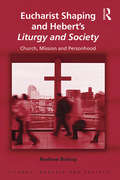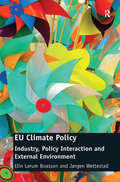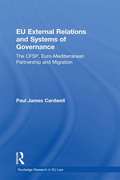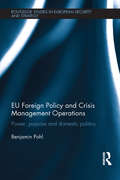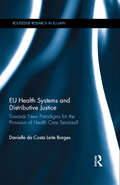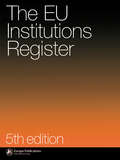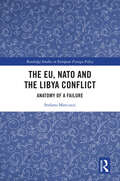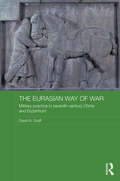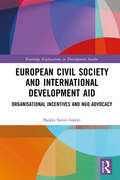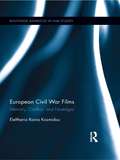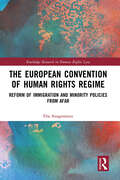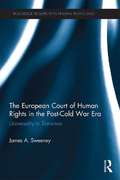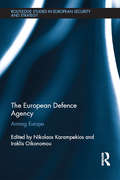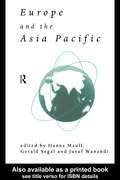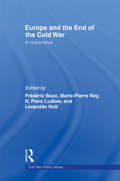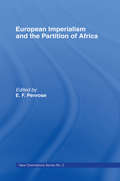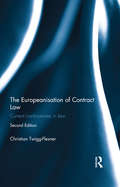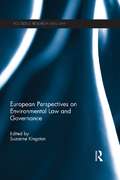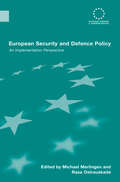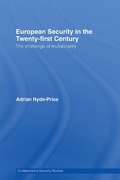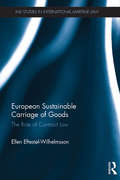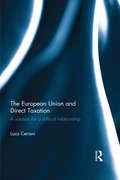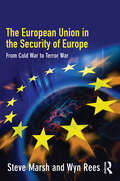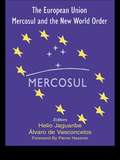Special Collections
Benetech’s Global Certified Accessible Titles
Description: Benetech’s GCA program is the first independent third-party EPUB certification to verify ebook accessibility. By creating content that is born accessible, publishers can meet the needs of all readers. Learn more: https://bornaccessible.benetech.org/
- Table View
- List View
Eucharist Shaping and Hebert’s Liturgy and Society
by Andrew BishopThe contemporary Church of England is wrestling with issues around the relationship between its worship and mission and relating both to wider society. Much of this hinges on an understanding of the nature of the Church. Gabriel Hebert's seminal book Liturgy and Society (1935) took as its subtitle, "The Function of the Church in the Modern World". For many this book inspired engagement with Eucharistic worship, with new patterns emerging, paving the way for further liturgical reform in the second half of the twentieth century. Eucharist Shaping and Hebert's Liturgy and Society re-examines Hebert's work, doing so uniquely in the light of the current dialogue about Church, liturgy and mission. Andrew Bishop argues that Hebert's contribution has been overlooked latterly and that a re-appreciation opens up fruitful ways of thinking and acting, making this book a distinctive contribution to a lively debate. If the options are reaction or novelty, Eucharist Shaping and Hebert's Liturgy and Society shows how Hebert's thinking subtly undermines both.
EU Climate Policy
by Jørgen Wettestad and Elin Lerum BoassonClimate policy is today a significant area of EU governance, providing important framework conditions for many industries. But how has EU climate policy developed? This book offers structured, comparative case studies of the development of four central climate policies: emissions trading systems, renewables, carbon capture and storage, and energy policy for buildings, examining the intriguing similarities and differences in how these have taken shape. Combining sociological New Institutionalism and political science theories in a novel and engaging way, Elin Lerum Boasson and Jørgen Wettestad explore and explain the history of EU climate policy. What emerges are fascinating stories - of skilled entrepreneurs who have managed to create and exploit political windows of opportunity, and of more long-term path-dependent developments. Drawing on more than 60 interviewees, the authors present accounts never told before, providing a valuable and timely contribution to our knowledge of environmental management and EU integration. This book is a must-read for all those seeking to understand the driving forces in EU climate policy and recognize its prospects for the future.
EU External Relations and Systems of Governance
by Paul James CardwellThis book takes a fresh look at the external relations of the European Union (EU) and in particular the Common Foreign and Security Policy (CFSP). Rather than focusing exclusively on the competence aspects of the institutions and actors, the book makes the case that the CFSP can be understood as a system of governance, which produces effects beyond the traditional tools associated with foreign policy. The theoretical approach draws on insights from new institutionalism, constructivism and the institutional theory of law and emphasises how the institutionalised forms of cooperation in the external sphere contribute to a social reality in which the ‘added value’ of the CFSP can be seen. Paul James Cardwell takes the Euro-Mediterranean Partnership (EuroMed) as a case study. Not initially a CFSP project, EuroMed has become the frame for EU foreign policy in the region as an emerging system of governance in which the EU institutions play a central role. Having recently been relaunched as the Barcelona Process: Union for the Mediterranean, it is a topical subject. With the increasing importance of migration on the EU’s agenda, the book looks at the relationship between migration, EuroMed and the CFSP and argues that the legal effects of the CFSP can be felt beyond the Treaty-based instruments. EU External Relations and Systems of Governance will be of interest to students and scholars of Law, Politics and European studies researching in the dynamic fields of EU external relations and foreign policy, as well as policy-makers and non-governmental organisations striving to better understand how the EU and its systems of governance operate.
EU Foreign Policy and Crisis Management Operations
by Benjamin PohlThis book explores the drivers of the EU’s recent forays into peace- and state-building operations. Since the Union’s European (now Common) Security and Defence Policy (ESDP/CSDP) became operational in 2003, the EU has conducted more than 20 civilian and military operations that broadly served to either deter aggression in host countries, and/or to build or strengthen the rule of law. This sudden burst of EU activity in the realm of external security is interesting from both a scholarly and a policy perspective. On one hand, institutionalised cooperation in the field of foreign, security and defence policy challenges the mainstream in IR theory which holds that in such sovereignty-sensitive areas cooperation would necessarily be limited. On the other hand, the sheer quantity of operations suggests that the ESDP may represent a potentially significant feature of global governance. In order to understand the drivers behind CSDP, EU Foreign Policy and Crisis Management Operations analyses the policy output in this area, including the operations conducted in the CSDP framework. Up until now, many studies inferred the logic behind CSDP from express intentions, institutional developments and (the potential of) pooled capabilities. By mining the rich data that CSDP operations represent in terms of the motives and ambitions of EU governments for the CSDP, this book advances our understanding of the framework at large. This book will be of much interest to students of European Security, EU policy, peacebuilding, statebuilding, and IR.
EU Health Systems and Distributive Justice
by Danielle Da Costa Leite BorgesEU Health Systems and Distributive Justice uses theories of distributive justice to examine tensions created by the application of the Internal Market rules to the provision of health care services within the European Union. Using the concepts and principles embedded in the theories of egalitarianism and libertarianism, this book analyses the impact of the Internal Market rules on common values and principles shared by European health systems, such as universality, accessibility, equity and solidarity. This analysis is conducted using the specific issue of cross-border health care. This book makes innovative contributions to the study of the relationship between EU health systems and the Internal Market – it encompasses the analysis of all principles recognised by EU institutions as guiding principles of European health systems; it integrates human rights law and practice into the discussion of the EU Court of Justice’s approach to patient mobility cases; and it assesses the potential impact of the Internal Market over EU health systems through the lens of distributive justice, looking at the underlying principles of these systems that are mostly concerned with social justice. Ultimately, this is not a book on EU law and health care, but it is a book on distributive justice, health care and the principles and policies guiding European health systems.
Eu Institutions Register
by EuropaDetails of over 5,900 key personnel in each of the major institutions, including: European Commission, European Parliament, Economic and Social Committee, Council of the European Union, Court of Justice, European Investment Bank, Court of Auditors, Committee of Regions and EU Agencies.
The EU, NATO and the Libya Conflict
by Stefano MarcuzziThis book explores the causes and implications of the Libyan crisis since the anti-Gaddafi uprisings of 2011 from the perspective of the EU and NATO. It asks the question of why those organizations failed to stabilize the country despite the serious challenges posed by the protracted crisis to European and transatlantic stakes in the region. This book argues that such failure originated in a twofold problem common to both organizations: their prioritization of legitimacy over strategy, and their path dependence – the insufficient degree of adaptation to meet the different needs of the crisis. Through a critical and integrated analysis of official sources and extensive interviews with EU, NATO, UN, and national government officials and militaries, as well as from NGO personnel, Libyan institutions and civil society, and media, the volume brings the perspective of both state and non-state actors to the fore. It reveals how wrong assumptions and centrifugal forces within the EU and NATO hampered initiatives, and how the inability to use hard power judiciously in an increasingly complex and multifaceted scenario worsened the crisis, which allowed for unprecedented influence of regional and global competitors such as Egypt, the United Arab Emirates (UAE), Turkey and Russia in the richest African country. This book will be of key interest for scholars and students of Libya and North Africa, NATO, the European Union, security and conflict studies, Middle East studies, migration, terrorism, peacebuilding and more broadly to international relations.
The Eurasian Way of War
by David A. GraffThis book is a comparative study of military practice in Sui-Tang China and the Byzantine Empire between approximately 600 and 700 CE. It covers all aspects of the military art from weapons and battlefield tactics to logistics, campaign organization, military institutions, and the grand strategy of empire. Whilst not neglecting the many differences between the Chinese and Byzantines, this book highlights the striking similarities in their organizational structures, tactical deployments and above all their extremely cautious approach to warfare. It shows that, contrary to the conventional wisdom positing a straightforward Western way of war and an "Oriental" approach characterized by evasion and trickery, the specifics of Byzantine military practice in the seventh century differed very little from what was known in Tang China. It argues that these similarities cannot be explained by diffusion or shared cultural influences, which were limited, but instead by the need to deal with common problems and confront common enemies, in particular the nomadic peoples of the Eurasian steppes. Overall, this book provides compelling evidence that pragmatic needs may have more influence than deep cultural imperatives in determining a society’s "way of war."
European Civil Society and International Development Aid
by Balázs Szent-IványiThis book explains how and why European non-governmental development organisations (NGDOs) engage in advocacy towards the European Union (EU). It analyses the heterogenous structure of the sector, with examples ranging from large multinational networks to essentially single person NGDOs. The book provides a detailed map of the topics which have featured in NGDO advocacy since 2006, arguing that NGDOs have generally been reactive in their advocacy towards the EU. The author explains how they have contested a number of policy issues on the agendas of the EU institutions, especially around the diversion of aid to manage migration and leverage private sector investments. Furthermore, some NGDOs have used the COVID-19 pandemic as an opportunity to re-package their pre-existing policy demands. Based on an analytical framework focused around three variables, namely moral vision, funding concerns, and the need to build/maintain a ‘good’ reputation, the book explains these advocacy choices, and argues that much of NGDO advocacy seems to be consistent with funding motivations. The author highlights the importance of moral vision and reputational concerns in moderating how far NGDOs will go with funding-driven advocacy, arguing that motivations need to be looked at in their complexity, and within the specific policy context. Drawing on a range of quantitative and qualitative data sets to provide a rich and varied picture of the advocacy work of European development NGOs, European Civil Society and International Development Aid is a key reference for researchers and practitioners working in the field.
European Civil War Films
by Eleftheria Rania KosmidouThis book examines the ways in which late twentieth-century European cinema deals with the neglected subject of civil war. Exploring a range of films about the Spanish, Irish, former Yugoslavia, and Greek civil wars, this comparative and interdisciplinary study engages with contemporary debates in cultural memory and investigates the ways in which cinematic postmemory is problematic. Many of the films present an idealized past that glosses over the reality of these civil wars, at times producing a nostalgic discourse of loss and longing. Other films engage with the past in a melancholic fashion. These cinematic discourses articulate contemporary concerns, especially the loss of ideology and a utopian political horizon in the aftermath of the collapse of the Soviet bloc in 1989, a date that marks a significant break in European history and an accompanying paradigm shift in European cultural memory. Filmmakers examined include Trueba, Cuerda, Loach, Jordan, Kusturica, Dragojević, and Angelopoulos.
The European Convention of Human Rights Regime
by Dia AnagnostouPrompted by an unprecedented rise of litigation since the 1990s, this book examines how the European Convention of Human Rights (ECHR) system and the Strasbourg Court interact with states and non-governmental actors to influence domestic change. Focusing on European Court of Human Rights litigation and state implementation of judgments related to minority discrimination and asylum/migration, it argues that a fundamental transformation of the Convention system has been under way. Repeat and strategic litigation, shifting methods of supervision and state implementation to remedy systemic violations, and above all the growing engagement of civil society and non-governmental actors, have prompted a distinctive trend of human rights experimentalism. The emergence of experimentalism has profound implications for the legitimacy, effectiveness and further reform of the ECHR system. This study provides an original constitutive account of regional human rights regimes and how they are activated by societal actors to claim rights, advance case law, and pressure for domestic legal and policy change. It will be of interest to international law and international relations scholars, political scientists, specialists on the ECHR, the Strasbourg Court, as well as to scholars interested in the human rights of immigrants and minorities.
The European Court of Human Rights in the Post-Cold War Era
by James A. SweeneyThe European Court of Human Rights in the Post-Cold War Era: Universality in Transition examines transitional justice from the perspective of its impact on the universality of human rights, taking the jurisprudence of the European Court of Human Rights as its detailed case study. The problem is twofold: there are questions about differences in human rights standards between transitional and non-transitional situations, and about differences between transitions. The European Court has been a vital part of European democratic consolidation and integration for over half a century, setting meaningful standards and offering legal remedies to the individually repressed, the politically vulnerable, and the socially excluded. After their emancipation from Soviet influence in the 1990s, and with membership of the European Union in mind for many, the new democracies of Central and Eastern Europe flocked to the Convention system. The voluminous jurisprudence of the European Court of Human Rights can now give us some clear information about how an international human rights law regime can interact with transitional justice. The jurisprudence is divided between those cases concerning the human rights implications of explicitly transitional policies (such as lustration), and those that involve impacts upon specific democratic rights during the transition. The book presents a close examination of claims by states that transitional policies and priorities require a level of deference from the Strasbourg institutions. The book proposes that states’ claims for leeway from international human rights supervisory mechanisms during times of transition can be characterised not as arguments for cultural relativism, but for ‘transitional relativism’.
The European Defence Agency
by Nikolaos Karampekios and Iraklis OikonomouThis volume provides a comprehensive understanding of the European Defence Agency (EDA), the leading EU armaments policy institution. Despite its critical role in European strategic and military affairs as the key hub of European policy-making in the field of armaments, the Agency has hitherto received very little attention by the academic and research community around Europe. To fill this gap in the literature, the book covers a multitude of inter-related themes and topics. Not only does it provide a detailed analysis and assessment of the Agency’s record as the first institution dealing solely with EU armaments policy, but it also links these findings to international relations and European integration theory. Thematically, the contributions go beyond the mere description of achievements, gaps and risks, elaborating on novel themes such as space, offsets, pooling and sharing, and transatlantic armaments relations. The book combines an interdisciplinary approach to the study of European defence with theoretical and ontological pluralism, and seeks to unveil the strategic, industrial, institutional and ideational sources of armaments collaboration and capability development under the aegis of the EDA. The multi-faceted orientation of the book will be of much interest to students of European security, EU institutions, defence studies, arms control and international relations in general.
Europe and the Asia-Pacific
by Gerald Segal and Hanns Maull and Jusuf WanandiEurope and the Asia-Pacific is the most wide-ranging and accessible book currently available on the increasingly important relationship between these two regions. Compiled by leading experts, it covers the historical background, contemporary political setting and the vitally important economic aspects of this relationship. Moving on to deal with security considerations and policy decisions it provides valuable insights into the developing partnership between Europe and the Asia-Pacific. Rigorous and up-to-date, it is born out of the work of the Council for Asia-Europe cooperation (CAEC), a body of think tanks that supports the Asia-Europe Summit Meeting (ASEM) process.
Europe and the End of the Cold War
by N. Piers Ludlow and Marie-Pierre Rey and Frédéric Bozo and Leopoldo NutiThis book seeks to reassess the role of Europe in the end of the Cold War and the process of German unification. Much of the existing literature on the end of the Cold War has focused primarily on the role of the superpowers and on that of the US in particular. This edited volume seeks to re-direct the focus towards the role of European actors and the importance of European processes, most notably that of integration. Written by leading experts in the field, and making use of newly available source material, the book explores "Europe" in all its various dimensions, bringing to the forefront of historical research previously neglected actors and processes. These include key European nations, endemic evolutions in the Soviet Union and Eastern Europe, European integration, and the pan-European process. The volume serves therefore to rediscover the transformation of 1989-90 as a European event, deeply influenced by European actors, and of great significance for the subsequent evolution of the continent.
The European Idea in History in the Nineteenth and Twentieth Centuries
by Alexander TchoubarianFirst Published in 1995. Routledge is an imprint of Taylor & Francis, an informa company.
European Imperialism and the Partition of Africa
by Ernest Francis PenroseThis volume seeks to explain the European partition of Africa between 1880-1900.
The Europeanisation of Contract Law
by Christian Twigg-FlesnerCritical yet accessible, this book provides an overview of the current debates about the ‘Europeanization’ of contract law. Charting the extent to which English contract law has been subject to this activity, it is the ideal volume for readers unfamiliar with the subject who wish to understand the main issues quickly. It examines a range of key developments, including: a string of directives adopted by the European Union that touch on various aspects of consumer law recent plans for a European Common Frame of Reference on European Contract Law. Bringing together advanced legal scholarship, critically examining key developments in the field and considering the arguments for and against greater convergence in the area of contract law, this is an excellent read for postgraduate students studying contract and/or European law.
European Perspectives on Environmental Law and Governance
by Suzanne KingstonThis book provides a range of perspectives on some of the most pressing contemporary challenges in EU environmental law and governance from some of today’s leading European environmental academics and practitioners. The book maintains a focus on three key cross-cutting issues, each of which is carefully analysed through the lens of governance. The first theme to be addressed is that of climate change and the problems it poses for EU governance. The second issue explored concerns the challenge of integrating environmental considerations into other policy areas, as is required by the Treaty on the Functioning of the European Union and the EU’s Charter of Fundamental Rights. Finally, the third theme centres on the important challenge of improving environmental enforcement within the EU, and considers issues such as the Aarhus Convention and the evolution of the Commission’s work on implementation and enforcement throughout the past twenty years. Each of these three themes is situated within the broader ongoing debate about the changing nature of European environmental governance post-Lisbon and the ways in which developments in this area fits within broader trends in European governance theory and policy generally. European Perspectives on Environmental Law and Governance contains contributions from experts in the field including; Mary Robinson, Alan Boyle, Ludwig Kramer and Liam Cashman, and will be of interest to academics, students and practitioners of EU environmental law.
European Security and Defence Policy
by Michael Merlingen and Rasa OstrauskaiteSecurity and defence is the area in which the EU has advanced most in recent years. A principal element of this process is the proliferating number of military and civilian crisis management missions in Europe, the Middle East, Africa and Asia. Clearly, Europe has come a long way since the disappointments and frustration in the 1990s, when, in light of the violent disintegration of Yugoslavia, analysts argued that the EU foreign and security policy was ‘neither common, nor foreign, nor dealing with security, nor (could) be called a policy.’ Since then the newly developed European Security and Defence Policy (ESDP) has become the necessary framework for the formulation and implementation of effective European security policy. This book is the first-ever in-depth inquiry of the ESDP in action. It analyzes the implementation of military and civilian missions in the Balkans, Southern Caucasus, Africa and Asia and asks what impact they have on the ground. The EUJUST Themis in Georgia, the Aceh Monitoring Mission in Indonesia as well as EUSEC-R.D. Congo and EUPOL Kinshasa are examined in The European Security and Defence Policy will be of interest to students and scholars of international relations, security, European studies, foreign policy, peacekeeping and transatlantic relations.
European Security in the Twenty-First Century
by Adrian Hyde-PriceCombining a sophisticated theoretical analysis with detailed empirical case-studies, this book provides an original view of the challenges and threats to a stable peace order in Europe. The end of Cold War bipolarity has transformed Europe. Using structural realist theory, Adrian Hyde-Price analyzes the new security agenda confronting Europe in the twenty-first century. Europe, he argues, is not ‘primed for peace’ as mainstream thinking suggests, rather, it faces new security threats and the challenge of multipolarity. This critical and original volume looks at European security after the Iraq War, the failure of the EU constitution and the change of government in Germany. Reflecting on the inherently competitive and tragic nature of international politics, it concludes that realism provides the only firm foundations for an ethical foreign and security policy. European Security in the Twenty-First Century will appeal to students and scholars of international relations, European politics and security studies.
European Sustainable Carriage of Goods
by Ellen Eftestøl-WilhelmssonThis work discusses the rapidly developing European transport policy on sustainable freight and the connected efforts initiated by the European Commission (EC) on greening transport by the means of contract law. Greening transport has been a central goal for the EU for decades. The main problem has been, and still is, that far too much carriage of goods within the EU is performed unimodally: by road carriage alone. This has caused severe problems particularly in central Europe, where both trade and environment is suffering from an ineffective transport industry with growing problems of congestion and pollution. A modal shift in transport from mainly road based to a form of transport in which more environmental friendly modes such as rail, inland waterways and sea born transport are integrated into one transport chain, is hence an objective of the EU. If successful, this model could then be extended to the international transport community. The key question raised in this book is whether the traditional role of contract law is changing to such an extent that the parties involved must take external interests into account. In the case of the EU’s efforts to enhance sustainable carriage of goods within its realm, the author explores whether governmental interference is necessary, or if we can trust that the parties will integrate environmental issues into their contracts because there is a demand for such clauses. The different proposals for an EU regime on multimodal contracts of carriage are discussed in this context. This book will be of great relevance to academics and practitioners with an interest in EU law, transport law, environmental law and maritime law in general.
The European Union and Direct Taxation
by Luca CerioniWithin the European Union, direct taxation is an area which often provokes controversy due to tensions between the tax sovereignty of the individual Member States and the desire for an integrated internal market. This book offers a critical review of the legislative and case-law developments in this area at the EU level, and reviews the European Commission’s proposed solutions in light of their concerns regarding the proper functioning of the EU’s internal market. Luca Cerioni set out a series of benchmarks determined from the objectives expressed by the European Commission, including: the elimination of double taxation and double non-taxation; the simplification of cross-border tax compliance; the reduction of abusive forum-shopping practices and general aggressive tax planning strategies; legal certainty for all businesses and individuals carrying on activities and receiving income in more than one EU Member State. Cerioni uses these benchmarks to ask which Directives and/or rulings have left legal uncertainty, and which have ended up creating or increasing the scope for aggressive tax planning. The book puts forward a comprehensive solution for a new optimal regime relating to tax residence, which would contribute to the EU project to the mutual benefit of Member States and taxpayers. As a thorough and critical discussion of EU tax rules in force, and of the European Court’s case law in direct taxation, this book will be of great use to academic researchers and students of EU law, tax practitioners, and policy-makers at the EU and national level.
The European Union in the Security of Europe
by Steve Marsh and Wyn ReesThis book examines the European Union’s contribution to providing security in Europe amidst an increasingly complex and challenging environment. In this new and comprehensive guide to the EU's role in security since the end of the Cold War, the authors offer an explanation of EU internal and external security regimes, and argue that the Union has become an important exporter of security within its region. However, the Union’s rhetorical ambitions and commitments continue to outstrip its capabilities and it lacks both a common conceptualisation of security and a meaningful, shared strategic culture. Drawing extensively on primary sources the book examines the Union’s relations with the US and Russia in a time of shifting geostrategic calculations and priorities. With the EU capacity for enlargement slowing, this text presents a detailed assessment of EU security policies towards Central Europe, the Mediterranean, the Western Balkans, Eastern Europe and South Caucasus. European Union Security will be of interest to students and scholars of the EU, security studies, and international relations.
The European Union, Mercosul and the New World Order
by Helio Jaguaribe and Alvaro VasconcelosA critical insight into the politics and economics of relations between the EU and Latin America, particularly Mercosul, highlighting the significance of such relations for multilateralism and the international order.
